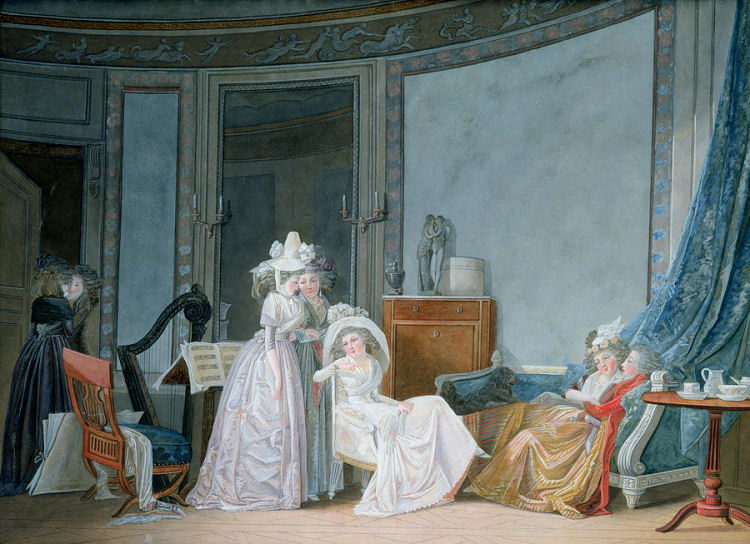Part 2: Les Tigresses des Salons: socialite women
Many literature salons were held by noble women, or women who were very closely connected to the Ancien Régime. Apart from that, mostly distinguished guests frequented these circles. Consequently, the salonnières were, either due to their social rank or that of their usual guests, predominantly restraint towards the Revolution, if not counter-revolutionary, and preferred to stay obscure and/or apolitical. The same is true for socialites, concubines and mistresses, who often were salonnières as well, and in any case relied on their aristocratic keepers. Thus, this section is, again, rather short and politically moderate.
 Marie Louise-Sophie de Grouchy-Condorcet, (1764-1822), salonnière, translator, feminist, favoured political rights for women (she may have influenced her husband, who demanded certain political right for women, in this manner). A liberal and fluent in several languages, she translated works of Thomas Paine and Adam Smith into French. After her husband’s death she published all of his writings. Here’s her portrait and here her Wikipedia entry.
Marie Louise-Sophie de Grouchy-Condorcet, (1764-1822), salonnière, translator, feminist, favoured political rights for women (she may have influenced her husband, who demanded certain political right for women, in this manner). A liberal and fluent in several languages, she translated works of Thomas Paine and Adam Smith into French. After her husband’s death she published all of his writings. Here’s her portrait and here her Wikipedia entry.
Thérésa Tallien, (1773-1835), salonnière. Nowadays, she is most famous for being a lover to, well, many men, having helped to bring to fall Robespierre, and for her extravagant life style during the Directoire. However, a staunch critic of catholicism, she is enthusiastic about the Révolution since its beginning and politically active, although as a rather moderate (she is said to have been member in the Club de 1789). She is interested in matters of education, makes a public speech on that issue in 1793, and especially supports the schooling of girls. Her Wikipedia entry is here, and her portrait here.
Jeanne-Marie „Manon“ Roland, (1754-1793), salonnière, girondist. She used her talent for socialising to promote her husband’s political career. An early adherent to theFrench Revolution, her salon became the rallying point of the Jacobins, later, after the split between “radicals” and “moderates”, the political centre of the Girondists. Mme Roland did not take direct political action, but she persued the debates, remained informed about the issues of the day, and thus influenced politics in letters and conversation. After the struggle for power between Girondists and Montagnards, in which the Montagnards prevailed, she was emprisoned and ultimately guillotined. Her Wikipedia entry is here, and her portrait here.
Fanny de Beauharnais (1737-1813), salonnière and noble woman. She was not really a supporter of the French Revolution, but befriended Anarchasis Cloots, who congratulated her to her “conversion” in 1793. Her Wikipedia entry is here, her portrait here.
Bathilde d'Orléans, (1750-1822), French princess of blood, wife of the Prince of Condé and mother of the Duke of Enghien, she soon fell out with her husband and her aristocratic family and, when the Revolution broke out, became an ardent supporter, similarly as her brother, Philippe Egalité. She renamed as „Citoyenne Vérité“, offered her goods to the Republic (before having confiscated them, however) and broke relations with her ex-husband and son who exiled and formed a military corps which fought the revolutionary Republic. Despite her republican ideals, she was imprisoned during Terreur, and forced to go into exile, where she opened a pharmacy for poor people. After returning to Restauration France, she cherished the memory of her executed son, but without reconciling with her family. Here is her Wikipedia entry, and here her portrait.
Keine Kommentare:
Kommentar veröffentlichen